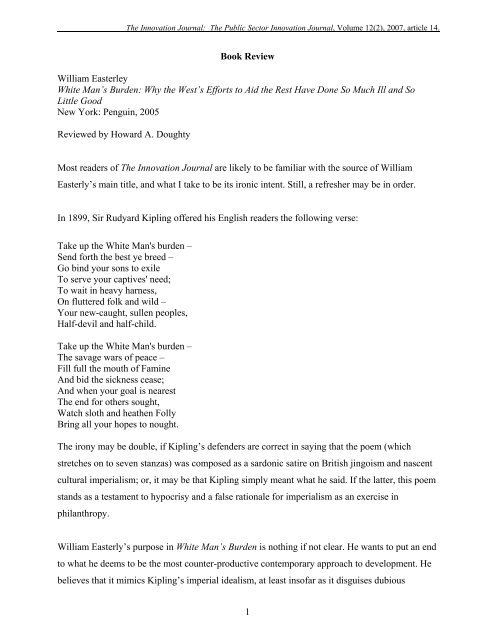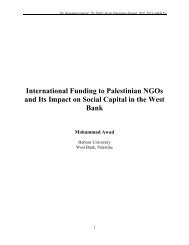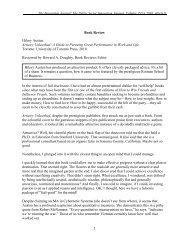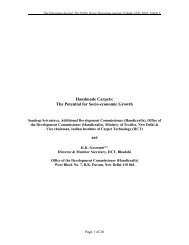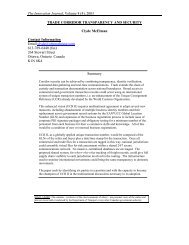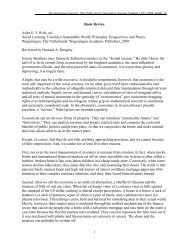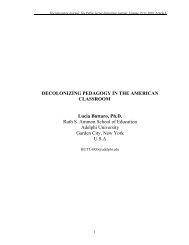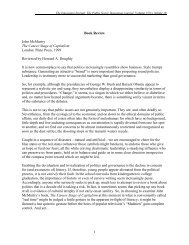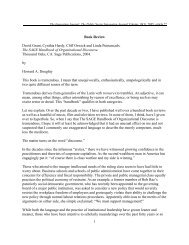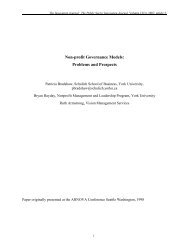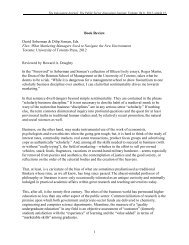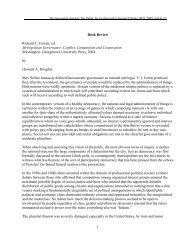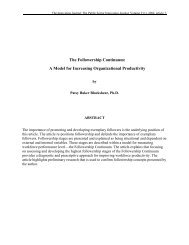William Easterley, White Man's Burden - The Innovation Journal
William Easterley, White Man's Burden - The Innovation Journal
William Easterley, White Man's Burden - The Innovation Journal
Create successful ePaper yourself
Turn your PDF publications into a flip-book with our unique Google optimized e-Paper software.
<strong>The</strong> <strong>Innovation</strong> <strong>Journal</strong>: <strong>The</strong> Public Sector <strong>Innovation</strong> <strong>Journal</strong>, Volume 12(2), 2007, article 14.<br />
Book Review<br />
<strong>William</strong> <strong>Easterley</strong><br />
<strong>White</strong> Man’s <strong>Burden</strong>: Why the West’s Efforts to Aid the Rest Have Done So Much Ill and So<br />
Little Good<br />
New York: Penguin, 2005<br />
Reviewed by Howard A. Doughty<br />
Most readers of <strong>The</strong> <strong>Innovation</strong> <strong>Journal</strong> are likely to be familiar with the source of <strong>William</strong><br />
Easterly’s main title, and what I take to be its ironic intent. Still, a refresher may be in order.<br />
In 1899, Sir Rudyard Kipling offered his English readers the following verse:<br />
Take up the <strong>White</strong> <strong>Man's</strong> burden –<br />
Send forth the best ye breed –<br />
Go bind your sons to exile<br />
To serve your captives' need;<br />
To wait in heavy harness,<br />
On fluttered folk and wild –<br />
Your new-caught, sullen peoples,<br />
Half-devil and half-child.<br />
Take up the <strong>White</strong> <strong>Man's</strong> burden –<br />
<strong>The</strong> savage wars of peace –<br />
Fill full the mouth of Famine<br />
And bid the sickness cease;<br />
And when your goal is nearest<br />
<strong>The</strong> end for others sought,<br />
Watch sloth and heathen Folly<br />
Bring all your hopes to nought.<br />
<strong>The</strong> irony may be double, if Kipling’s defenders are correct in saying that the poem (which<br />
stretches on to seven stanzas) was composed as a sardonic satire on British jingoism and nascent<br />
cultural imperialism; or, it may be that Kipling simply meant what he said. If the latter, this poem<br />
stands as a testament to hypocrisy and a false rationale for imperialism as an exercise in<br />
philanthropy.<br />
<strong>William</strong> Easterly’s purpose in <strong>White</strong> Man’s <strong>Burden</strong> is nothing if not clear. He wants to put an end<br />
to what he deems to be the most counter-productive contemporary approach to development. He<br />
believes that it mimics Kipling’s imperial idealism, at least insofar as it disguises dubious<br />
1
<strong>The</strong> <strong>Innovation</strong> <strong>Journal</strong>: <strong>The</strong> Public Sector <strong>Innovation</strong> <strong>Journal</strong>, Volume 12(2), 2007, article 14.<br />
motives behind a veil of benign intensions. <strong>The</strong> contemporary development industry, involving<br />
an array of academic analysts, government bureaucrats, official international agencies, NGOs and<br />
rock stars such as Bob Geldoff and Bono, is portrayed by Easterly as thriving in the discredited<br />
Kiplingesque tradition. <strong>The</strong>y generate utopian schemes, engage in fruitless social engineering<br />
projects, toss good money after bad and fail at (almost) all times to achieve positive results in<br />
poor nations. Indeed, if their efforts did not pay off handsomely for themselves, they could be<br />
diagnosed as organizationally insane – which can be described as repeating unsuccessful<br />
strategies in the vain hope that the same action, repeated often enough, will yield different results.<br />
<strong>The</strong>ir motto might be: “If it didn’t work yesterday, we’ll do the same thing today … only more<br />
so.”<br />
This is what Easterly has to say about his Homeric rival, Jeffrey Sachs:<br />
“Sachs is returning to the way things were done 50 years ago, it’s like in the Back to the Future<br />
movies … Take a look at Korea: the economy was growing at around 3%, the United States shut<br />
down the aid flow and growth picked up to 10%. No poverty trap there. China is another example,<br />
it’s moving ahead without any aid. This is what infuriates me about Sach’s intellectual<br />
irresponsibility. He’s promoting ideas which have been abandoned by the whole development<br />
profession with the exception of a handful. He is popularizing them, and that’s extremely<br />
dangerous because bad ideas can kill, literally.”<br />
Easterly also directs his fire at those who follow people like Sachs. “If today the people of certain<br />
countries are as poor as they were a few decades ago, it’s partly because some vested interests are<br />
an obstacle; but it’s also because bad economic ideas have been applied: central planning,<br />
socialism … over and over again.”<br />
What, then, does Easterly propose? Rescued from his unrelentingly deep purple prose, his<br />
recommendations seem sensible enough. He urges that attention be given to people “on the<br />
ground,” so to speak. Instead of massive injections of funds to national and international projects,<br />
he suggests smaller ventures that have a higher likelihood of success because they connect with<br />
local communities and foster local interests. It is not that Easterly opposes all foreign aid; he<br />
seems merely to want it to be more focused, less grandiose and more directed toward short-term<br />
2
<strong>The</strong> <strong>Innovation</strong> <strong>Journal</strong>: <strong>The</strong> Public Sector <strong>Innovation</strong> <strong>Journal</strong>, Volume 12(2), 2007, article 14.<br />
assistance that might produce better long-term self-reliance. “Give a man a fish, you feed him for<br />
a day; teach a man to fish, you feed him for a life-time,” and all that.<br />
Easterly is especially upset at what he calls the arrogance of Western development experts whom<br />
he sees as entering into situations from above, convinced of their own brilliance, imperiously<br />
self-righteous and secretively contemptuous of the people they are purportedly trying to help. It is<br />
the missionary position all over again.<br />
From this perspective, it is not difficult to draw an inference from Easterly’s enduring complaint.<br />
Max Boot, makes the point in <strong>The</strong> Savage Wars of Peace: Small Wars and the Rise of America’s<br />
Power (2003): “In the early twentieth century, Americans talked of spreading Anglo-Saxon<br />
civilization and taking up the 'white man's burden'; today they talk of spreading democracy and<br />
defending human rights. Whatever you call it, this represents an idealistic impulse that has<br />
always been a big part in America's impetus for going to war.”<br />
In fact, Easterly himself draws a similar conclusion. <strong>The</strong> grand development strategies, he says,<br />
amount to a “repetition of the mistakes committed in the war in Iraq: a naïve and arrogant focus<br />
on solving problems from the top with a big plan; and without having the slightest idea about the<br />
often confusing realities underlying these problems. It’s as difficult to reform and improve the<br />
foreign aid system as it is to democratize the Middle East.”<br />
<strong>The</strong> proposition that the invasion and occupation of Iraq was ever motivated by a desire to defend<br />
human rights or to democratize the Middle East is another – but related – matter, and will not be<br />
discussed here. Rather, the more immediate question is whether the “whole development<br />
profession” merely another guise for furthering Western domination of the underdeveloped<br />
countries? It may be, but this is not the direction in which Easterly seems determined to go. <strong>White</strong><br />
Man’s <strong>Burden</strong> seems more inclined toward what might, in other circumstances, be called the<br />
advocacy of “tough love.” He acknowledges that international assistance has its place, but he<br />
insists that “aid has to be focused on those areas where it works, with quantifiable objectives and<br />
by organizations which can be held accountable. Such unquantifiable things as fighting poverty<br />
in general or promoting economic progress have to be kept out of foreign aid.”<br />
3
<strong>The</strong> <strong>Innovation</strong> <strong>Journal</strong>: <strong>The</strong> Public Sector <strong>Innovation</strong> <strong>Journal</strong>, Volume 12(2), 2007, article 14.<br />
Easterly is especially hostile to the United Nations’ Millennium Development Goals. Directed by<br />
Jeffrey Sachs, this initiave is dedicated to cutting world poverty in half by 2010. It may<br />
accomplish this goal depending on how low the standard is set, and which countries are to be<br />
included in the assessment. <strong>The</strong> economic growth of China alone, might come close to tipping<br />
the scales, depending upon what is agreed to be the operational definition of poverty. If, however,<br />
it is like most other campaigns to reduce agony and enhance liberty, it is likely to miss its target.<br />
With this in mind, it is not hard to rankle at photo-op philanthropy and to sympathize with<br />
Easterly’s scepticism.<br />
<strong>The</strong> problem comes with the scope of Easterly’s vision. He is right to say that pompous public<br />
relations campaigns are not to be encouraged, and that attention should be paid to work which<br />
accomplishes concrete tasks that help people to help themselves. He is right to insist that aid<br />
packages have specific purposes that are immediate, effective and transparent and involve<br />
indigenous populations in the administration of funds. He is all for targeted projects that “give<br />
food supplements to these undernourished children, or piped water to these villages which lack it,<br />
or vaccinate this population”; however, once minimal survival has been assured, Easterly quickly<br />
falls back upon a model of private investment that resembles the early phases of Western<br />
capitalism and eschews dreaded socialism. He expresses his preferred methods in these terms:<br />
“Poverty never has been ended and never will be ended by foreign experts or foreign aid. Poverty<br />
will end as it has ended everywhere else, by homegrown political, economic, and social reformers<br />
and entrepreneurs that unleash the power of democracy and free markets.”<br />
In Easterly’s scheme of things, the best plan for development is to have no plan, to embrace the<br />
free market and to step forward and grasp the “invisible hand.” He disdains the aspirations of<br />
well-fed “planners,” and contrasts them to lean and hungry “searchers.” His litany is intended<br />
demolish the former: “In foreign aid,” he says, “planners announce good intentions but don’t<br />
motivate anyone to carry them out; Searchers find things that work and get some reward.<br />
Planners raise expectations but take no responsibility for meeting them; Searchers accept<br />
responsibility for their actions. Planners determine what to supply; Searchers find out what is in<br />
demand. Planners apply global blueprints; Searchers adapt to local conditions. Planners at the top<br />
lack knowledge of the bottom; Searchers find out what the reality is at the bottom. Planners never<br />
4
<strong>The</strong> <strong>Innovation</strong> <strong>Journal</strong>: <strong>The</strong> Public Sector <strong>Innovation</strong> <strong>Journal</strong>, Volume 12(2), 2007, article 14.<br />
hear whether the planned got what it needed; Searchers find out whether the customer is<br />
satisfied.”<br />
This, observes Harvard’s esteemed economist Amartya Sen, is at best a gross oversimplification.<br />
He adds that Easterly’s “overblown attack on global ‘do-gooders’ obscures the real point: that aid<br />
can work, but only if done right.” Sen outlined some of the major methodological, logical and<br />
rhetorical flaws in <strong>White</strong> Man’s <strong>Burden</strong> in an article published in the March/April, 2006 issue of<br />
Foreign Affairs. I will repeat only the one he admits is less important, but which has the virtue of<br />
brevity. Easterly points out that “there was no Marshall Plan for Harry Potter, no International<br />
Financing Facility for books about underage wizards.” Moreover, he says with evident sincerity,<br />
“it is heartbreaking that global society has evolved a highly efficient way to get entertainment to<br />
rich adults and children, while it can't get twelve-cent medicine to dying poor children.” Just so.<br />
<strong>The</strong> market is a terrible place to find a cure for heartbreak.<br />
To this unusual display of sentimentalism, Sen responds that “the disparity in the results is indeed<br />
heartbreaking. But jumping from there to arguing that the solution to the latter problem is along<br />
the same lines as the solution to the former reflects a misunderstanding of what makes the latter<br />
so much more difficult.” He then adds that “J. K. Rowling was on welfare support and received a<br />
grant from the Scottish Arts Council when writing the first Harry Potter novel.” Apparently,<br />
untargeted aid sometimes hits the mark.<br />
Unsympathetic critics charge that Easterly exaggerates, which he does. <strong>The</strong>y say he uses<br />
inappropriate comparisons, which he does (the absence of foreign aid may not be the real reason<br />
that China has gained economic power). <strong>The</strong>y also argue that he has become a shill for neoliberal<br />
ideologues and greedy global corporations which dislike any effort to enhance the lives of the<br />
poor, especially if such programs run the risk of leading to state-mandated increases in wages,<br />
trade union rights, safe working conditions, employment equity, environmental protection and so<br />
on, which is probably an unfair accusation but not wholly out of the range of possibility (even<br />
capitalists have their “useful idiots”).<br />
Sympathetic critics agree with many of Easterly’s case studies of waste, profligacy and selfaggrandizement<br />
among professional helpers. For those who recall the book and know the origin<br />
5
<strong>The</strong> <strong>Innovation</strong> <strong>Journal</strong>: <strong>The</strong> Public Sector <strong>Innovation</strong> <strong>Journal</strong>, Volume 12(2), 2007, article 14.<br />
of the phrase, there is much to be said for the good works of the “ugly American,” a noble and<br />
dedicated aid worker in 1950s Sarkhan (a thinly veiled fictional Vietnam) whom Easterly would<br />
surely credit for selfless devotion to helping people “on the ground.” As well, they lament his<br />
tendency to overstatement and his preference for acrimony where decent and more productive<br />
dialogue could have been established.<br />
What remains obscure and especially worrisome, however, is how desperately poor people with<br />
doubtless demands but little capacity to purchase any available supplies can be expected to<br />
transform bare subsistence economies into flourishing exchanges of surplus goods and what<br />
happens afterwards in those instances where foreign assistance succeeds – either from the<br />
largesse of bumptious international aid boosters or from small scale Adam Smiths intent on<br />
freeing up enterprise and searching for success.<br />
One way or another, a place will be found for large investors in the event that there are natural<br />
resources or human skills to be exploited at corporate rates. That may be a problem for another<br />
time, but it is still a problem. It has appeared in one form in Bolivia, where water is considered an<br />
important consumable. Private corporations (Suez from France and Bechtel for the USA) made<br />
agreements with the Bolivian government – under pressure from the World Bank – to privatize<br />
the country’s water supply. <strong>The</strong> results were popular uprisings in Cochabamba and El Alto. Even<br />
among the poor in Latin America’s poorest country, consumer rebellions have galvanized people<br />
against the world’s most likely alternative to socialism. Peddling the kind of pre-industrial free<br />
market theories that have been eclipsed by the invention of the limited liability corporation may<br />
appeal to antiquarian populists and aging libertarians; but, in its own way, it is no less naïve than<br />
disseminating the dreams of bureaucratic do-gooders.<br />
<strong>The</strong> slogan that adorns the World Bank Headquarters in Washington D. C. reads: “Our dream, a<br />
world free of poverty.” Easterly, who worked for the World Bank for enough years to know,<br />
considers it a social engineering conglomerate; others see it as an instrument of corporate<br />
globalization. Both may be right. Perhaps there is another way.<br />
Howard A. Doughty is Book Reviews Editor of <strong>The</strong> <strong>Innovation</strong> <strong>Journal</strong> and teaches at Seneca<br />
College of Applied Arts and Technology, King City, Canada.<br />
6


